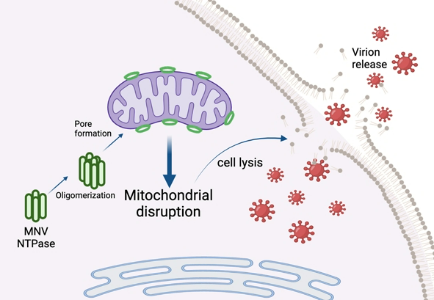
Principal Investigator
Microbiology
guoxunwang(at)szbl.ac.cn
2025-PresentThe Shenzhen Bay laboratory Junior Principal Investigator
2017-2024The UT Southwestern Medical Center Postdoctoral Fellow
2012-2016The Institute of Genetics and Developmental Biology,Chinese Academy of Sciences Ph.D.
My lab primarily investigates the pathogenesis of enteric viruses and antiviral immune response. Our research group focuses on: (1) identification the receptors of enteric viruses; (2) study the egress of enteric viruses and the mechanism of cell death induced by infection; (3) development the vaccines of enteric viruses.
Dr. Guoxun Wang has long been dedicated to studying cell death, a central hub of host-pathogen microbe interactions, and published papers in Nature, Science, Cell Host Microbe, Science Immunology, Nature Nanotechnology, Science Advance, Journal of Virology. He has identified a new type of host cell death induced by viral infection and this research demonstrated that, through co-evolution with hosts, noroviruses have acquired membrane-disrupting domains from host cell death proteins, enabling the virus to actively trigger cell death and promote virus spread within host tissues (Nature, 2023). This study deeps understanding of cell death and provides a new potential target for antiviral therapy. Dr. Wang’s another work revealed how plants recognize bacterial toxins and activate immune responses that lead to cell death. This research contributed to the discovery and characterization of resistosome, providing critical insights into how intracellular immune receptors are activated to mediate plant immune responses (Cell Host Microbe, 2015).

The pore-forming protein of norovirus initiate programmed cell death for viral egress
2015 National Scholarship for Doctoral Students, China
2015 Outstanding PhD Student Award of Yikai Kerry, Institute of Genetic Development, Chinese Academy of Sciences
1. Wang GX, Zhang D, Orchard RC, Hancks DC, Reese T. Norovirus MLKL-like protein initiates cell death to induce viral egress. Nature, 2023. 616:152-158.
2. Wang GX, Zarek C, Chang T, Tao LL, Lowe A, Reese T. Th2 cytokine modulates herpesvirus reactivation in a cell type-specific manner. Journal of Virology,2021.95: 8.
3. Wang GX, Roux B, Feng F, Guy E, Li L, Li N, Zhang X, Lautier M, Jardinaud MF, Chabannes M, Arlat M, Chen S, He C, Noël LD, Zhou JM. The decoy substrate of a pathogen effector and a pseudokinase specify pathogen-induced modified-self recognition and immunity in plants. Cell Host Microbe, 2015. 18: 1-11.
4. Wang JZ, Hu MJ, Wang J, Qi JF, Han ZF, Wang GX, Qi YJ, Wang HW, Zhou JM, Chai JJ. Reconstitution and structure of a plant NLR resistosome conferring immunity. Science, 2019. 04, 364 (6425).
5. Wang JZ, Wang J, Hu MJ, Wu S, Qi JF, Wang GX, Han ZF, Qi YJ, Gao N, Wang HW, Zhou JM, Chai JJ. Ligand-triggered allosteric ADP release primes a plant NLR complex. Science, 2019. 04, 364 (6435).
6. Zhang D, Wang GX, Yu X, Wei T, Farbiak L, Johnson LT, Taylor AM, Xu J, Hong Y, Zhu H, Siegwart DJ. Enhancing CRISPR/Cas gene editing through modulating cellular mechanical properties for cancer therapy. Nature Nanotechnology, 2022. 05, 17(7): 777-787.